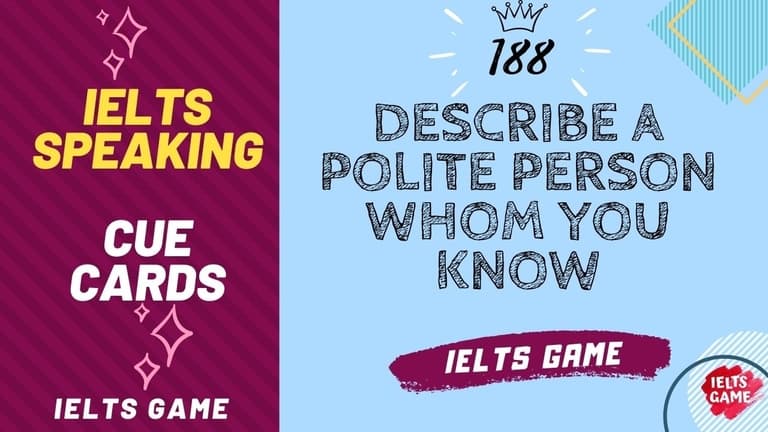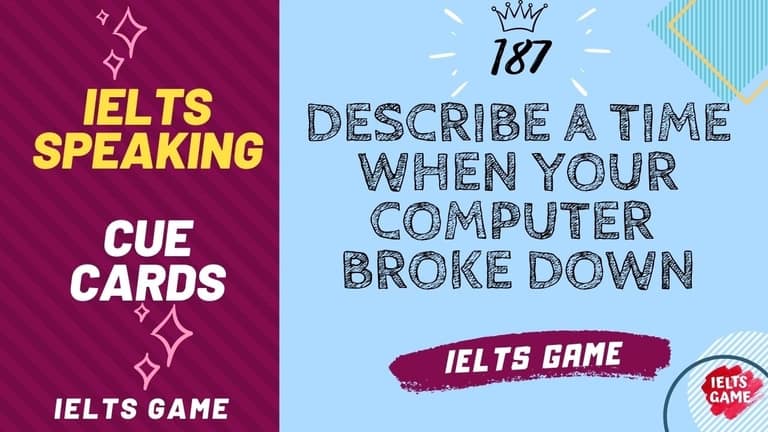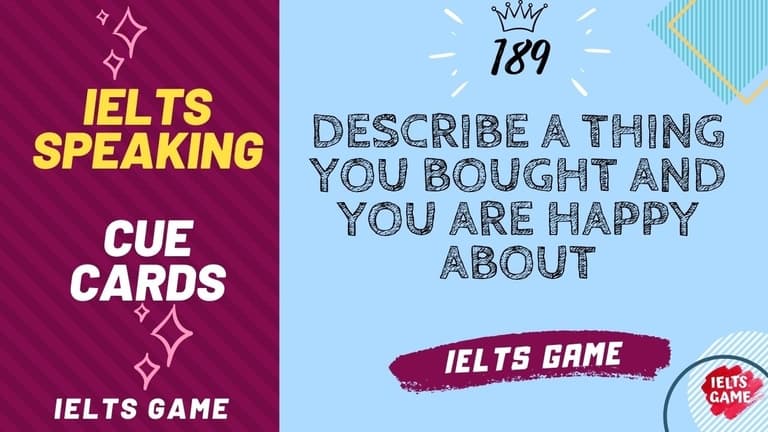188. IELTS Cue Card -
Describe a polite person whom you know
In this article, IELTS Game will add number 188 IELTS cue card sample on the series of 2021 cue cards with band 9.0 model answers and part 3 follow up questions that will help you in your IELTS test preparation.
This cue card is related to “Polite person description” topic and asking you to “Describe a polite person whom you know“ and asking IELTS speaking part 3 follow up questions from Makkar Jan-Apr 2021 cue cards guesswork.
IELTS Cue Card Sample 188
Describe a polite person whom you know.
You should say:
- – Who is the person?
- – How you know him/her?
- – And explain why you think this person is polite?
Band 9.0 Sample Answer Ideas.
• Politeness is a very nice quality.
• I know many polite persons but here I would like to talk about the politest person known to me.
• He is none other than my father.
• He is in his late forties.
• He is not very tall but looks very handsome.
• His hair is graying at the temples but he doesn’t dye his hair.
• He believes in going grey gracefully.
• He does not do anything special to show his politeness.
• His politeness is reflected by his way of talking to others.
• He is very helpful.
• I have seen that many times he goes out of the way to help others.
• That is why everyone in my family and neighbourhood loves him.
• He is very predictable.
• Even if he is himself sad or depressed, he never lets it affect us.
• He is a perfect role model for us.
• My grandfather is a bit short tempered but my father always shows respect to him and does whatever he says.
• He is also a perfect husband.
• He always listens to my mother and lets her have her way in family matters.
• They both are a perfectly happy couple.
• He is also a perfect father.
• Whenever I am wrong or make any unfair demand, he reasons with me like a friend.
• He believes that if we want to earn love and respect then we must first learn to give love and respect.
• He uses the word ‘ji’ for calling anyone. For example, if calls our gardener as maaliji and our laundryman as dhobiji.
• That is why I consider him to be the politest person known to me.
IELTS Speaking part 3 Follow Up Questions.
Here are some follow up questions you may be asked during part 3 IELTS Speaking exam by the IELTS examiner related to 1st cue card:
“Describe a polite person whom you know”
Politeness in Your Country
1. Do you think you are a polite person?
Yes, I think I’m a polite person. I don’t speak rudely with anyone. I try to help anyone who comes to me for help.
2. How do you show politeness?
I don’t think anyone can show politeness. It just reflects in one’s behavior.
3. Do you think politeness is important?
Yes, politeness is very important. Politeness begets politeness. If we are polite to others, only then we can expect politeness from them.
4. In your opinion, why is it important to show respect to others?
It is important to show respect to others, because it reflects our own nature. If you will respect others only then you will get respect from others. If you will disrespect others, no one will care for you.
5. Can you give me some other examples of how people show politeness in your country?
In my country, people show politeness in many ways. Giving an elderly person your seat in the bus is one method of showing politeness. Standing up when the teacher comes in the class is another way of showing politeness.
Stopping your car to let the pedestrian cross the road is also a way of showing politeness. Helping an elderly person cross the road is also a way of showing politeness.
Cross-Cultural Relations
6. Do you think there are any differences between politeness in your country and in the West? OR
Do you think politeness is different in different countries and parts of the world?
I don’t think politeness has anything to do with the country one comes from. There are polite and impolite people in every country.
7. How can one evaluate other cultures?
One can evaluate other cultures by talking to the people, and sharing views with them.
8. What do you think might happen if the nations of the whole world showed respect to other nations?
If the nations of the whole world showed respect to other nations, then life would become very harmonious and beautiful.
Politeness in Your Country (in your culture)
Teaching Children about Politeness
9. How can parents teach their children to be polite? OR How do parents in your country teach their children to be polite?
Parents can teach their children to be polite, by setting an example in front of them. If parents are polite, children automatically learn politeness.
10. Can you think of any examples when young children are not very polite?
Children are not polite when they go to the park and don’t offer their swing to the other children when their turn comes.
Children are not polite, when they make too much noise and disturb people of the neighborhood. Children are not polite when they go to somebody’s house and mess things up.
11. Do you think there is a certain age when children should be expected to be polite?
No, I don’t think so. Children should be taught politeness and should learn to be polite from a very young age.
Public Awareness of Politeness
12. Do you think that everyone in society is aware of what is and isn’t polite behaviour?
More people are aware of polite and impolite behavior.
13. Sometimes there are occasions when the government (or some other authority) wants to remind people about being polite. Can you think of any examples of that?
Sometimes, the government has to appeal to the people to be patient and polite. This happens especially on festivals, when people drink and forget what it is right or wrong.
14. What methods can (or does) the government use to remind people about some aspect of politeness?
The government takes the help of media such as TV or radio to aware people.
Truthfulness and Politeness
15. Do you always tell the truth to people?
No, not always! Sometimes a white lie also has to be spoken. For example, recently my six-year-old niece drew a flower, which was not very nice, but I told her that it was very beautiful because I didn’t want to hurt her feelings.
16. Do you think people are (or should be) honest all the time when they speak to others?
Yes, people should be honest when they speak to each other. But sometimes, it is okay to speak a
white lie, if the situation demands it.
17. Do you think telling lies is impolite? OR Are there any times when it might be polite to tell a lie?
No, not always! White lies are not impolite. A doctor might have to tell his patient who is at a late stage of cancer that he will get well very soon, even if it is not the truth.
We have to sometimes to use white lies with children to motivate them.



